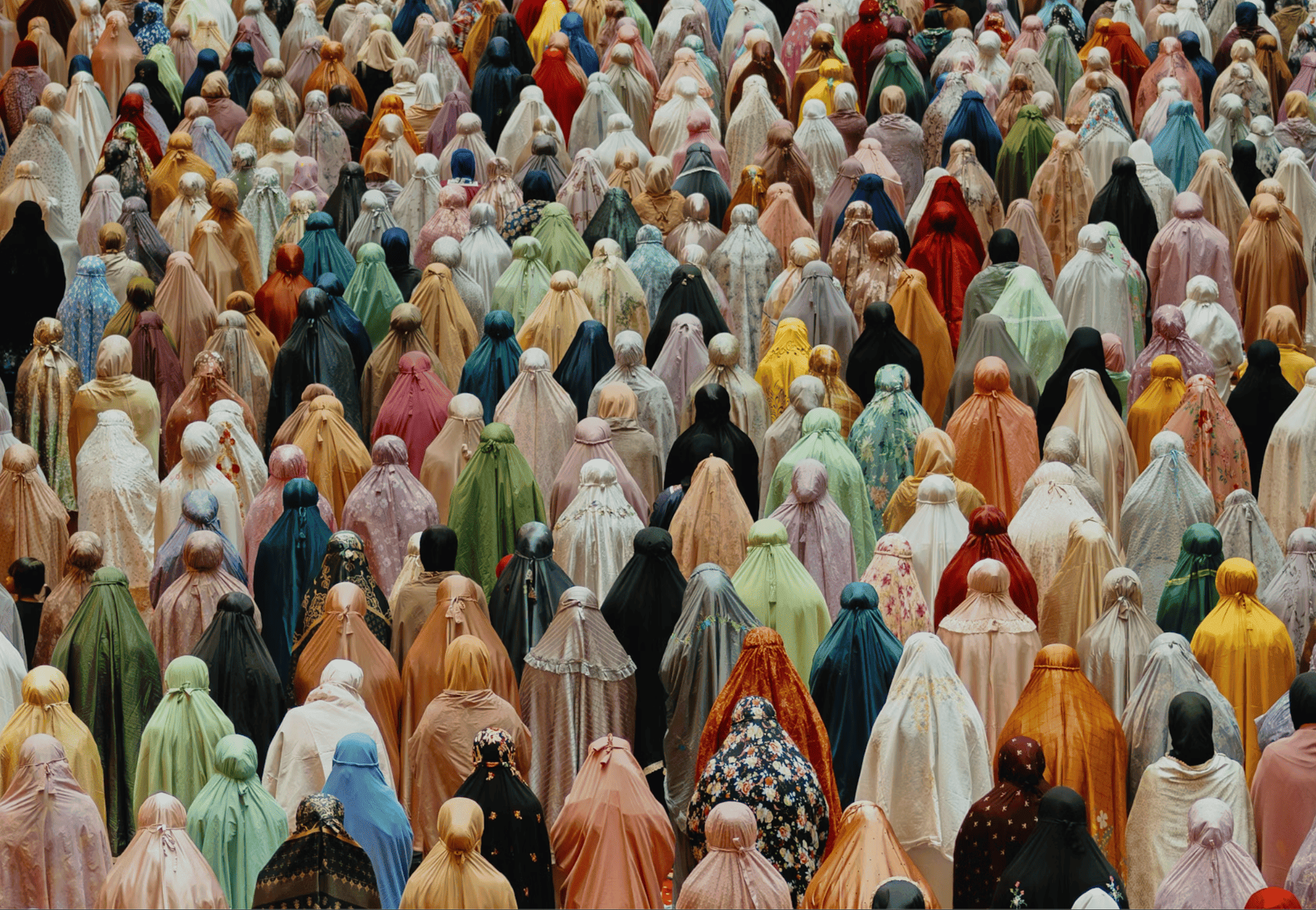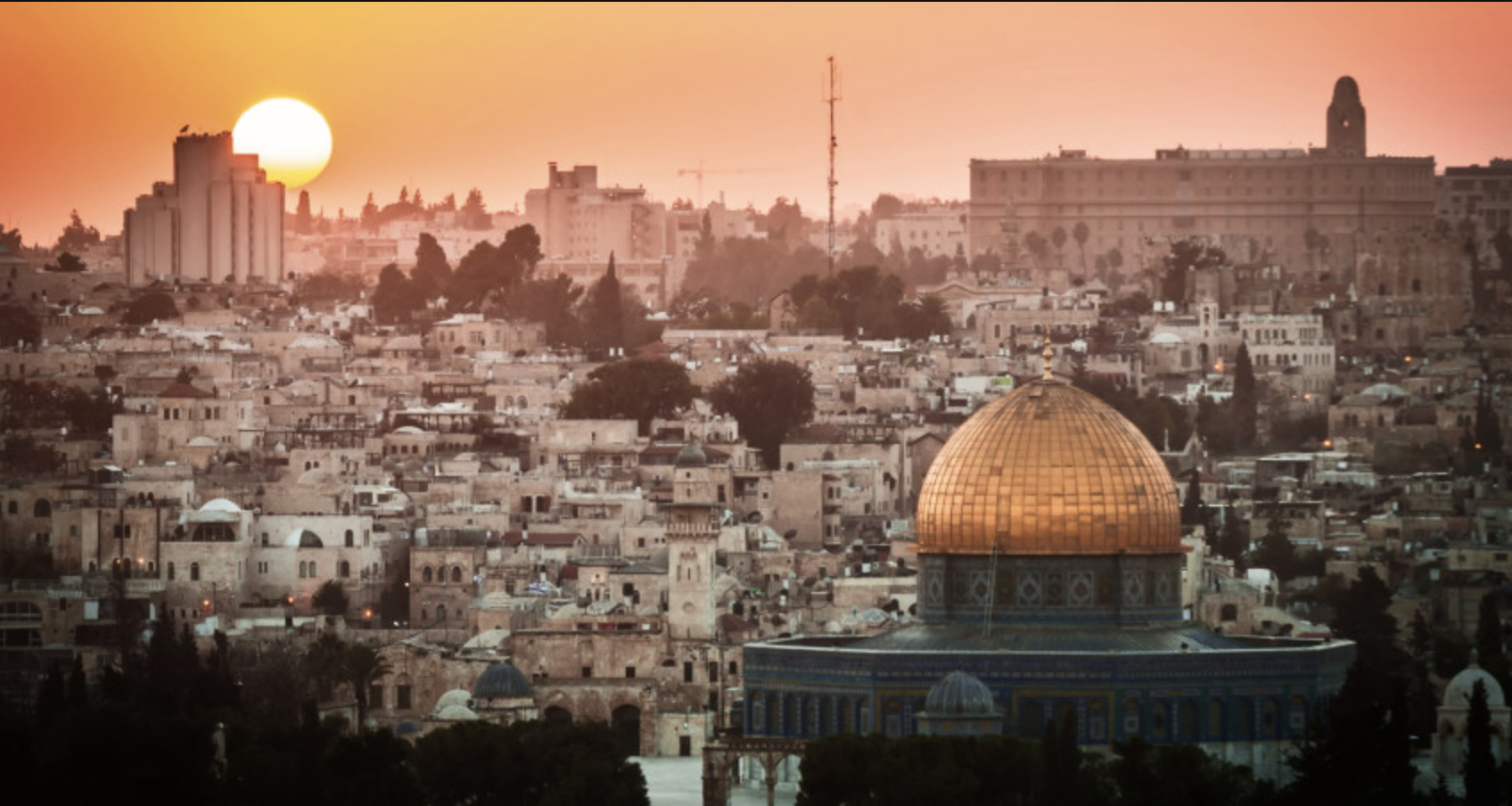The Origins of Idolatry
Between Prophet Adam عليه السلام and Prophet Nuh عليه السلام, there were ten generations, and all of them used to be upon the teachings of Islam. Shirk first started amongst the people of Prophet Nuh عليه السلام when they exaggerated the status of five righteous men from their ranks. Let’s look at the case of the first idol to be worshipped named Waddan.
Imam Ibn Kathir حفظه الله narrates, “Waddan was a righteous man in Babylon, who was loved by his people. When he died, the people gathered around his grave in grief. Shaitan came to them and said, “I have seen your sorrow because of this man’s death; can I make a statue like him that could be put in your meeting place to make you remember him?” They said. “Yes.” So, he made a statue like him and they placed it in their meeting place in order to be reminded of him and do good deeds.
When Shaitan saw their interest in remembering him, he said, “Can I build a statue of him in the home of each of you so that he would be in everyone’s house and you could remember him?” They agreed. Their children learned about and saw what they were doing. They also learned about their remembrance of him, until they took him to be a deity and worshiped him instead of Allah. So, the first to be worshiped instead of Allah was Waddan, the idol which they named thus.” [Tafsir Ibn Kathir] The people eventually had many idols, the five mentioned being the most popular because of the deep love they had for them. Prophet Nuh عليه السلام was the first Messenger to be sent to mankind to tackle the issue of idolatry and to guide those worshipping other than Allah.
At the advent of the coming of our Prophet Muhammad ﷺ no other Prophet was alive on the face of the Earth, yet the Shariah of few remained. The Shariah of Prophet Ibrahim عليه السلام and Ismail عليه السلام which included rites of Hajj, tawaf around the Ka’bah, calling upon Allah, etc remained but slowly got heavily distorted.
Idol worship was a foreign concept among the Arabs. Even the Arabic word for an idol, ‘Sanam’, is clearly derived from the Aramaic term, ‘Selem’. It all began when a man from Banu Khuza’ah named Amr Ibn Luhayy travelled to Syria and saw the grandeur that surrounded an idol called Hubal. The Amalkites were a powerful and successful people who worshipped this idol and attributed their success to the idol. In a case of inferiority complex and wanting to bring this 'glory and advancement' to his tribe he assumed that they must be correct since they are so powerful. He ended up paying a heavy sum for the idol and brought it back into the courtyard of the Haram in Makkah. Amr was a respected man, a leader of his tribe whom the people loved. That is why when he brought a 'new idea', the people followed him and ended up worshipping the idol. Amr lived around the same time as Fihr who was the founder of the Quraysh. Based on this, it can be approximated that for nearly five hundred years idolatry spread and took root in Arabia.
In another report, as recorded by Imam Ibn Hajar رحمه الله, Amr ibn Luhayy also introduced the worship of the images of Wadd, Suwa’, Yaghuth, Ya’uq, and Nasr. These were the idols worshipped by the people of Prophet Nuh. It is said that a Jinn informed Amr that the images of those gods were to be found at a certain place in Jeddah and asked him to bring them from there and to worship them. [Fath al-Bari]
It is also reported that Amr ibn Luhayy changed the talbiyah for Hajj. The original talbiyah is:
لبيك اللهم لبيك، لبيك لا شريك لك لبيك
Labbayk Allahumma Labbayk! Labbayka la Shareeka laka Labbayk!
Here I am, O Allah, Here I am! Here I am, You have no partner, Here I am!
Amr ibn Luhayy changed it to:
لبيك اللهم لبيك، لبيك لا شريك لك إلا شريكاً هو لك، تملكه وما ملك
Labbayk Allahumma Labbayk! Labbayka la Shareeka lak Illaa Shareekan Huwa lak Tamlikuhu wa maa Malak
Here I am, O Allah, Here I am. Here I am, You have no partner except for a partner who belongs to You, and You control the partner and all that he controls.
Between Amr ibn Luhayy and Prophet Ismail عليه السلام, hundreds of years passed without any Messenger being sent with guidance to the Arabs. Ignorance prevailed and people started to deviate from the Shariah of Prophet Ibrahim عليه السلام. This happens because when one isn't in touch with something for over a period of time it'll eventually be forgotten, fade, and wither away. Since the people were ignorant of the teachings of the purity and strength of their Shariah they very easily fell for the glamorous faith of the 'most powerful nation' and rejected the past. When they opened their doors to the acceptance of Shirk, then like a stack of dominoes, it lead to opening more doors to acceptance of innovation and evil practices from the disbelievers. Later, the pagan Arabs had the audacity to claim they were following Prophet Ibrahim عليه السلام but in reality they were following nothing more than their desires and the religion of their forefathers under a religious pretentious mask.
These different idols were then distributed to the people coming for Hajj. Ibn Abbas رضي الله عنه said, "The idols that were among the people of Nuh wound up among the Arabs afterward. In reference to Wadd, it became the idol of the people of Kalb in the area of Dawmat Al-Jandal. Suwa’ became the idol of the people of Hudhayl. Yaghuth became the idol of the people of Murad, and then the people of Bani Ghutayf at Al-Juruf in the area of Saba' worshipped it after them. Ya’uq became the idol of the people of Hamdan. Nasr became the idol of the people of Himyar for the family of Dhu Kala’. These idols were all named after righteous men from the people of Nuh. [Bukhari]
How Did the Worship of Stones Spread in Arabia?
Imam Ibn Ishaq رحمه الله mentions that when the descendants of Prophet Ismail left from Makkah, each group took with them a stone from the sacred precincts as a memento of the Ka‘bah. They would then place these stones at suitable spots in their new settlements, do tawaf around them just as they used to do around the Ka‘bah, and venerated them. Gradually, their succeeding generations began to worship not only those stones but any stone that was similar to their special stone or one that looked special.
Abu Raja Al-Utaridi narrated, "We used to worship stones, and when we found a better stone than the first one, we would throw the first one and take the latter, but if we could not get a stone then we would collect some earth (i.e. soil) and then bring a sheep and milk that sheep over it, and perform the Tawaf around it." [Bukhari]
Idolatry spread in the society, till every tribe had an idol that they worshipped. Not just tribes, but at times, even families had a special idol that they venerated and worshipped. At the time of the birth of the Prophet, around 360 idols were housed inside the Ka’bah. The most important of these was Hubal that had been brought there by Amr ibn Luhayy.

The Paganism of The Arabs
Just like in the case of the people of Prophet Nuh, we see gradual corruption spreading in the beliefs of the Arabs:
- Most pagan deities were named after Allah’s Attributes. The most famous of their deities were Al-Lat, Al-Uzza, and Manat. They were considered as the daughters of Allah. They derived Al-Lat as a feminine form of Allah and Al-Uzza from Al-Azeez. We see that the 3 main deities had 3 origins: human, plant, and stone.
- The Arabs had taken the pagan idea that these goddesses, as well as the
- angels, would act as ‘mediators’ between them and Allah.
- Al-Lat was a man who used to mix Sawiq (a kind of barley mash) with water for the pilgrims coming for Hajj during Jahiliyyah. When he died, they remained next to his grave and eventually worshipped him. The people of Taif, the tribe of Thaqif and their allies, worshipped Al-Lat.
- References to Al-Lat are found in several Nabatean inscriptions where she is called, “The Mother of Gods”.
- Al-Uzza was originally a cluster of shrubs or trees on which the idolators placed a monument and curtains. The planet Venus was revered as a great goddess under the name of Al-Uzza, which can be rendered as, ‘The Most Mighty.’ They believed that the goddess resided in these trees which were located in the area of Nakhlah, between Makkah and Taif. The Quraysh revered Al-Uzza.
- Just like Abdullah is a common name today Abd Al-Uzza was a common name in Jahiliyyah.
- Manat was an idol made out of a black stone that represented the goddess of destiny in the area of Mushallal near Qudayd, between Makkah and Madinah. The tribes of Khuza’ah, Aws, and Khazraj used to revere Manat.

Besides the Ka‘bah at Makkah, the Arabs had built places of worship in key locations. They built houses for their idols to resemble the Ka’bah.
- The Idol of Al-Lat was worshipped in Taif.
- The idol of Al-Uzza was worshipped in Nakhlah.
- The idol of Manat was worshipped at Qudayd near the Red Sea.
- The idol of Dhul Khalasah was worshipped in Tabalah. It was called the Southern Ka’bah while the Ka’bah in Makkah was called the Northern Ka’bah.
The Hunafa of Makkah
Around the same time in Makkah, some traces of the teachings of Prophet Ibrahim still remained. A handful of people abstained from idol worship. These men were known as Hanif (plural: Hunafa') which means "turning away from." They are called the Hunafa' because they turned away from idolatry and shirk to Allah.
- Waraqah ibn Nawfal ibn Asad: This was the paternal cousin of Khadijah bint Khuwaylid ibn Asad رضي الله عنها . Waraqah was nearly 40 years older than her. He eventually chose a blend of Christianity and Judaism for his religion that considered Jesus to be a slave of Allah, without divinity. He was a scholar of the old scriptures and knew that the emergence of the foretold prophet was forthcoming. When Prophet Muhammad ﷺ narrated his story to him, he immediately recognized Angel Jibreel عليه السلام as the same angel who would visit Prophet Musa عليه السلام. Before his death, he affirmed Prophet Muhammad ﷺ as the Messenger of Allah.
- Ubaydullah ibn Jahsh: He was the paternal cousin of the Prophet ﷺ through one of his aunts and the brother of Zaynab bint Jahsh رضي الله عنها . He initially chose Christianity before accepting Islam. He migrated to Abyssinia with his wife. In Abyssinia, he fell into the habit of alcohol and later committed apostasy by embracing Christianity again. After his death, his wife Ramlah Umm Habibah would go on to marry the Prophet ﷺ.
- Uthman ibn al-Huwayrith: He chose Christianity and eventually moved out of Makkah before the birth of Prophet Muhammad ﷺ. It is reported that he went to Rome and was influenced by Trinitarian Christianity. He tried to return and get his people to follow this new religion but he was mocked and abandoned by his tribe. The Romans also abandoned him and he died wandering the wild as a Christian.
- Zayd ibn Amr ibn Nufayl: He is the first cousin of Umar ibn al-Khattab ibn Nufayl. He was most probably the strongest from among the listed Hunafa in terms of pristine monotheistic belief. He did not opt for either Christianity or Judaism.
He travelled to Palestine seeking the true religion of Prophet Ibrahim عليه السلام. He met a Jewish scholar and later on met a Christian scholar as well. It became clear to him that this was not what Prophet Ibrahim عليه السلام was upon. He left the place, raised both his hands, and said, "O Allah! I make You my Witness that I am on the religion of Ibrahim." [Bukhari]
He would publicly speak against the Quraysh for their idol worship and offering sacrifices in the name of the idols. The Prophet (ﷺ) met Zayd in Makkah before prophethood. A meal was presented to the Prophet (ﷺ) but he refused to eat from it. It was also presented to Zayd who said, "I do not eat anything which you slaughter in the name of your stone idols. I eat none but those things on which Allah's Name has been mentioned at the time of slaughtering."
Zayd ibn Amr used to criticize the way Quraish used to slaughter their animals, and used to say, "Allah has created the sheep and He has sent the water for it from the sky, and He has grown the grass for it from the earth, yet you slaughter it in other than the Name of Allah.” [Bukhari]
He was extremely vocal against the pagan practice of burying daughters alive. He would adopt all of the daughters that the Quraysh wanted to kill and raise them as his own. He would say to him, "Do not kill her for I will feed her on your behalf." So he would take her, and when she grew up nicely, he would say to her father, "Now if you want her, I will give her to you, and if you wish, I will feed her on your behalf." [Bukhari]
It is reported that he died five years before Prophet ﷺ began propagating the message of Islam. The Prophet ﷺ said, "He will be resurrected on the Day of Judgment as his own Ummah." His son, Sa'eed ibn Zayd would go on to become not just a prominent sahabi but one of the ten sahaba promised Jannah.
- Quss ibn Sa'ida: He was a prominent man from the tribe of Banu Iyad who used to publicly warn the Quraysh from idolatry and even composed poetry about it.
The Return to Monotheism
When Prophet Muhammad ﷺ entered Makkah at its conquest in 8 AH, he removed all the 360 idols that were placed in and around the Ka’bah. He sent his companions to different parts of Arabia where shrines were built and idols were worshipped to have them destroyed. Some of the companions whom the Prophet ﷺ sent were:
- Mughirah ibn Shu’bah and Abu Sufyan Sakhr bin Harb to destroy the idol of Al-Lat.
- Khalid ibn al-Waleed to destroy the idol of Al-Uzza.
- Ali ibn Abi Talib and Sa’d ibn Zayd al-Ashhali to destroy the idol of Manat.
- Amr ibn al-‘Aas to destroy the idol of Suwa’.
- Jareer ibn Abdullah al-Bajali to destroy the idol of Dhul Khalasah.
- Ali ibn Abi Talib to destroy the idol of Fals.
Allah teaches us,
وَلَئِن سَأَلْتَهُم مَّنْ خَلَقَ ٱلسَّمَـٰوَٰتِ وَٱلْأَرْضَ لَيَقُولُنَّ ٱللَّهُ ۚ قُلْ أَفَرَءَيْتُم مَّا تَدْعُونَ مِن دُونِ ٱللَّهِ إِنْ أَرَادَنِىَ ٱللَّهُ بِضُرٍّ هَلْ هُنَّ كَـٰشِفَـٰتُ ضُرِّهِۦٓ أَوْ أَرَادَنِى بِرَحْمَةٍ هَلْ هُنَّ مُمْسِكَـٰتُ رَحْمَتِهِۦ ۚ قُلْ حَسْبِىَ ٱللَّهُ ۖ عَلَيْهِ يَتَوَكَّلُ ٱلْمُتَوَكِّلُونَ
If you ask them (O Prophet) who created the heavens and the earth, they will certainly say, “Allah!” Ask (them), “Consider then whatever (idols) you invoke besides Allah: if it was Allah’s Will to harm me, could they undo that harm? Or if He willed (some) mercy for me, could they withhold His mercy?” Say, “Allah is sufficient for me. In Him (alone) the faithful put their trust.” [Surah az-Zumar, 38]
وَيَعْبُدُونَ مِن دُونِ ٱللَّهِ مَا لَا يَضُرُّهُمْ وَلَا يَنفَعُهُمْ وَيَقُولُونَ هَـٰٓؤُلَآءِ شُفَعَـٰٓؤُنَا عِندَ ٱللَّهِ ۚ قُلْ أَتُنَبِّـُٔونَ ٱللَّهَ بِمَا لَا يَعْلَمُ فِى ٱلسَّمَـٰوَٰتِ وَلَا فِى ٱلْأَرْضِ ۚ سُبْحَـٰنَهُۥ وَتَعَـٰلَىٰ عَمَّا يُشْرِكُونَ
They worship besides Allah others who can neither harm nor benefit them, and say, “These are our intercessors with Allah.” Ask (them, O Prophet), “Are you informing Allah of something He does not know in the heavens or the earth? Glorified and Exalted is He above what they associate (with Him)!” [Surah Yunus, 18]
وَمَنْ أَضَلُّ مِمَّن يَدْعُوا۟ مِن دُونِ ٱللَّهِ مَن لَّا يَسْتَجِيبُ لَهُۥٓ إِلَىٰ يَوْمِ ٱلْقِيَـٰمَةِ وَهُمْ عَن دُعَآئِهِمْ غَـٰفِلُونَ
And who could be more astray than those who call upon others besides Allah - (others) that cannot respond to them until the Day of Judgment, and are (even) unaware of their calls? [Surah al-Ahqaf, 5]












